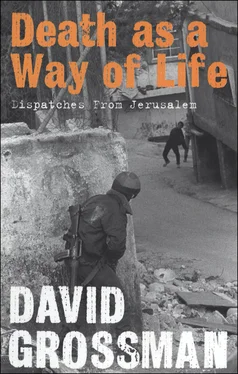David Grossman - Death as a Way of Life
Здесь есть возможность читать онлайн «David Grossman - Death as a Way of Life» весь текст электронной книги совершенно бесплатно (целиком полную версию без сокращений). В некоторых случаях можно слушать аудио, скачать через торрент в формате fb2 и присутствует краткое содержание. Год выпуска: 2013, Издательство: Bloomsbury Publishing, Жанр: Прочая документальная литература, на английском языке. Описание произведения, (предисловие) а так же отзывы посетителей доступны на портале библиотеки ЛибКат.
- Название:Death as a Way of Life
- Автор:
- Издательство:Bloomsbury Publishing
- Жанр:
- Год:2013
- ISBN:нет данных
- Рейтинг книги:5 / 5. Голосов: 1
-
Избранное:Добавить в избранное
- Отзывы:
-
Ваша оценка:
- 100
- 1
- 2
- 3
- 4
- 5
Death as a Way of Life: краткое содержание, описание и аннотация
Предлагаем к чтению аннотацию, описание, краткое содержание или предисловие (зависит от того, что написал сам автор книги «Death as a Way of Life»). Если вы не нашли необходимую информацию о книге — напишите в комментариях, мы постараемся отыскать её.
Death as a Way of Life — читать онлайн бесплатно полную книгу (весь текст) целиком
Ниже представлен текст книги, разбитый по страницам. Система сохранения места последней прочитанной страницы, позволяет с удобством читать онлайн бесплатно книгу «Death as a Way of Life», без необходимости каждый раз заново искать на чём Вы остановились. Поставьте закладку, и сможете в любой момент перейти на страницу, на которой закончили чтение.
Интервал:
Закладка:
John Paul II came to this city today. In many ways, the visit here was perhaps the climax of his journey, yet it was the least uplifting day. The streets were nearly empty, and there was tension in the air. Politics brushed aside human warmth.
But this does not detract from the day’s historic events: the visit to the mosques on the Temple Mount, the visit to the Western Wall. Perhaps you need to be Jewish to understand the significance of the moment: The Pope at the Western Wall. Even this phrase sounds like an oxymoron.
Excuse me if I speak for a moment as a resident of Jerusalem (that is, with all that history on my back). The Western Wall stands above all other Jewish national or religious symbols; it is the most important monument to the Jewish people’s continuity. Paradoxically, the fact that it is not a whole, that it is but a remnant of the Temple that was destroyed, has made it into what it is in the consciousness of every Jew in the world. Jews have prayed in its direction three times a day, a depiction of the wall hung in the home of nearly every Jew in the Diaspora, and scraps of paper bearing their most intimate requests of God were interred in the fissures among its huge stones.
The Pope’s visit here today testifies, principally, to Judaism’s enormous life force. This tiny nation, numbering 12 million people — about equal to the number of inhabitants of Cairo or London — has succeeded, over four thousand years, in preserving a culture, language, and identity, despite countless attempts to destroy all these. It also has succeeded in instilling, in the hearts of its most bitter enemies — the Church in the past, the Arab states today — the understanding that it must be reckoned with. Acknowledged not only for its existence, but also for the importance of its contribution to mankind.
But that’s not all. The Pope, in coming here, in his entire visit, taught us that something else is possible. That even religious establishments, those dogmatic institutions, may grow through openness to and curiosity about other religions. It is hardly credible that, in the third millennium, religions will continue to be nurtured by the hatred of the other. On the contrary, they must begin to carry out their moral and humane precepts. The time has come for a revision of relations between religions and nations.
That, I think, is the essence of the Pope’s visit in Israel.
Over the course of six days, John Paul II succeeded in capturing the hearts of Jews, Arabs, and Christians. The most surprising effect he had was on the Jews. It had to do with his personal history from the time of World War II, and with his positions toward the Jewish people, but it was also a result of his unique personality. He captured the hearts of Israelis in a way that few foreign leaders have ever done before. A cabdriver from Tiberias expressed this sentiment best: “What a sweet guy that Pope is. If you ask me, he’s really a Jew!” (And I’m sure that the Pope would appreciate the compliment.)
For six days we followed him into the forge of our identity, Jews, Arabs, and Christians, Israelis and Palestinians. We were with him in places where our wounds are still bleeding. But somehow, in a wonderful way that is new to us, his visit made us consider how different and better our lives here could be if we stopped seeing the Other as an existential threat. If we began, for a change, to take joy in the variety of cultural and human richness that this country, and the entire region, offers.
True, the war over geopolitical issues did not really cease during his visit, yet this heavyset man, whose face is both elderly and childlike, passed through at his slow, meditative gait, and with simple gestures made connections between churches, mosques, and the Western Wall. He connected the suffering of the Palestinians in the refugee camps with the most profound fears of the Israelis. He linked the great miracles of ancient days with the little miracles of our daily lives.
I do not know what of all this will remain in our region after he returns to his own land. It’s reasonable to assume that, in the days to come, if the negotiations between Israel and Syria and the Palestinians resume, the sides will again take more extreme positions, sparking hostility anew.
But for one week a different wind blew here; there was a sense of reconciliation. For a moment we tasted the possibility of a different kind of life, free of hatred and the exhausting need to always be an enemy. For this small miracle I, a nonreligious Jew, say to John Paul II, Thank you.
Despite It All
July 2000
Two weeks of marathon negotiations in Camp David between Barak and Arafat and their teams came to a disappointing finish at the end of July 2000. Despite President Clinton’s continuous efforts to force both sides to make compromises and to reach a much-needed agreement, they blamed each other — as they continue to do to this day — for the failure of this crucial summit. Insider reports claimed that the major disagreements were over the status of Jerusalem and the Palestinian “right of return.” The personalities of the Israeli and Palestinian leaders also seem to have contributed to the difficulties in the negotiations.
I
Yesterday was a heartbreaking day for all those who hoped that the Israeli and Palestinian people had finally comprehended that if they cannot live together, they cannot live at all. The cheers of the extremists of both nations demonstrated, more than anything else, the fearsome perversion that we have become so accustomed to: the prospect of war delights many on both sides much more than does the possibility of peace.
In keeping with his character, Ehud Barak arrived at the summit confident, audacious, and truly wanting to end the conflict forever. Perhaps from the start there was not much likelihood that such an ambitious program would succeed, but on the other hand, after a century of antagonism, all the problems are already known, all the obstacles are familiar, so why not launch a full-scale charge toward peace with the same force and determination we have all used charging on the battlefield?
Indeed, the innovation in these talks — and the source of hope for the future — was that the two sides were able, for the first time, to touch the conflict’s raw nerves — the question of the refugees, the Palestinians’ right of return, the settlements, and the status of Jerusalem.
Touching these nerves led, of course, to the predictable reflex — the body politic instantly jerked and tensed, both peoples’ muscles cramped up, and religious adrenaline flowed into the national bloodstreams.
Numerous Israelis and Palestinians immediately enlisted in the campaign to shore up defenses against the threat of compromise. Both sides promulgated religious rulings, signed by rabbis and Muslim muftis, declaring that there could be no territorial compromise in the land of our forefathers. The Palestinians went even further and announced that any leader who agreed to such a compromise, especially on holy Jerusalem, al-Quds, would be denounced as a traitor — his fate a bullet in the head. The army and the police, in Israel and the Palestinian Authority, were put on alert, and their commanders issued bellicose warnings. Barak’s government was left with almost no ministers who supported his strange eagerness to make peace; and Arafat’s ministers tried to outdo each other with warnings against making any concession. And the result?
The two peoples proved once again that they are still not capable of living together, yet neither are they able to disconnect from each other. They did not have the fortitude to take the final step, the one that would have led to a real metamorphosis in their relations. Even after the extraordinary American effort at mediation they remained in a clench, strangling each other in a double nelson, victims of the cowardly and fanatic way of thinking that so many years of hatred have created. The maps that tried to trace new borders, convoluted and peppered with enclaves, demonstrated to all the impossible snarl of the current situation, resembling a divorce agreement between a husband and wife who must continue to live out their lives in the same apartment, and sometimes even in the same bed.
Читать дальшеИнтервал:
Закладка:
Похожие книги на «Death as a Way of Life»
Представляем Вашему вниманию похожие книги на «Death as a Way of Life» списком для выбора. Мы отобрали схожую по названию и смыслу литературу в надежде предоставить читателям больше вариантов отыскать новые, интересные, ещё непрочитанные произведения.
Обсуждение, отзывы о книге «Death as a Way of Life» и просто собственные мнения читателей. Оставьте ваши комментарии, напишите, что Вы думаете о произведении, его смысле или главных героях. Укажите что конкретно понравилось, а что нет, и почему Вы так считаете.












